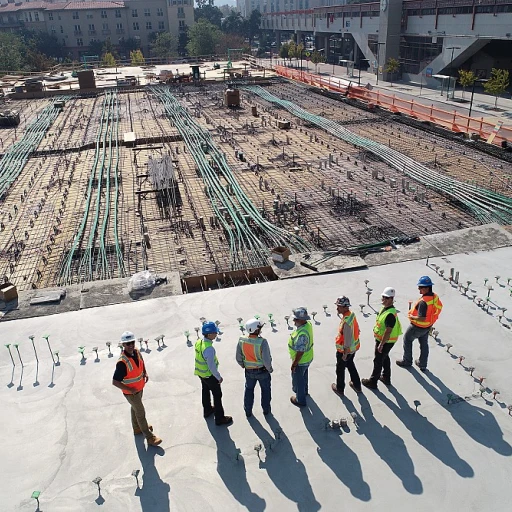
Understanding the Role of an Estimator
Grasping the Core Responsibilities of an Estimator
In the realm of construction and project management, the role of an estimator is pivotal. An estimator is responsible for analyzing project requirements and calculating the costs involved. This includes everything from materials and labor to time and unforeseen expenses. The ultimate goal is to provide accurate cost estimates that help in budgeting and planning.
When preparing for an estimator interview, it's crucial to understand the breadth of responsibilities this role entails. Estimators must ensure accuracy in their calculations to avoid cost overruns and project delays. They work closely with team members to gather necessary data and use software tools to streamline the estimation process.
Estimators are often required to specialize in specific areas such as electrical or construction projects. For instance, an electrical estimator will focus on the costs associated with electrical components and systems. This specialization requires a deep understanding of the field and the ability to stay updated with industry trends and standards.
Moreover, estimators need to possess strong problem-solving skills to address any issues that arise during the estimation process. They must also be adept at communicating their findings and collaborating with team members to ensure that all aspects of the project are considered.
For those looking to delve deeper into crafting effective interview guides for tech hiring, exploring resources on effective interview guides can provide valuable insights.
Key Skills to Look for in an Estimator
Identifying Must-Have Skills for Estimators
When hiring for an estimator role, pinpointing the essential skills is crucial to ensure the candidate is well-suited for the position. Understanding these skills will not only contribute to the accurate cost estimation but also facilitate smooth project management. Below are key areas where potential hires should demonstrate competency.- Analytical Skills: The ability to analyze large volumes of data and extracting meaningful conclusions is pivotal. Applicants need to demonstrate problem-solving skills by providing examples from their past experience in preparing cost estimates.
- Attention to Detail: To ensure accurate cost estimation, estimators must display meticulous attention to detail. Hiring managers should pose interview questions that ascertain the candidate's ability to identify errors and rectify them promptly.
- Software Proficiency: With the rise of automation in construction projects, familiarity with cost estimating software is non-negotiable. Candidates should illustrate their competency with industry-standard software tools they have utilized in previous roles.
- Industry Knowledge: An effective estimator possesses an in-depth understanding of the construction domain, including specific sectors like electrical estimation. Awareness of current trends ensures that candidates stay updated with market fluctuations and technological advancements.
- Communication Skills: Estimators must communicate effectively with team members and stakeholders to convey complex data clearly. Assess alignment with your team by gauging their ability to articulate process explanations succinctly during the interview.
Technical Questions to Assess Competence
Assessing Core Competencies in Estimator Interviews
In the hiring process for estimator roles, it's vital to evaluate the candidate's technical capability, particularly in regards to cost estimation and project management skills. Below are some critical interview questions that can help hiring managers determine an applicant's technical proficiency:- Experience with Cost Estimating Software: Which cost estimating software tools have you used, and how do you ensure their effectiveness in delivering accurate cost estimates? A candidate's familiarity with current software highlights their readiness to contribute effectively to the estimation process.
- Project Cost Estimation Techniques: Can you walk us through your cost estimation methodology for a recent project? This question provides insight into the candidate's understanding of estimation processes and their ability to deliver reliable cost estimates for construction projects.
- Handling Complex Estimation Challenges: Describe a scenario where you faced a challenging estimation problem. How did you use your problem-solving skills to address it? Such queries help assess how the candidate leverages their knowledge and skills to provide solutions amid uncertainty.
- Understanding of Electrical Estimation: For electrical estimator roles, it's crucial to probe about their specific experience with electrical cost estimates. How familiar are you with electrical systems related to cost estimation, and what are the key challenges you've faced in this domain?
- Ensuring Accuracy in Cost Estimates: How do you ensure accuracy and mitigate errors in your estimates? Understanding the candidate's measures to maintain high accuracy levels in estimates is pivotal for effective cost management.
Behavioral Questions to Gauge Cultural Fit
Behavioral Insights for Estimator Roles
When interviewing candidates for estimator roles, understanding how they fit within your team and company culture is crucial. Behavioral questions are designed to uncover how a candidate's past experiences and actions align with your organization's values and work environment. These questions help hiring managers assess whether the candidate can effectively collaborate with team members and adapt to the company's workflow.
Here are some key behavioral interview questions to consider:
- Team Collaboration: "Can you provide an example of a time when you had to work closely with a team to complete a project? How did you ensure effective communication and collaboration?" This question helps gauge the candidate's ability to work well with others, a vital skill for any estimator who needs to coordinate with various departments.
- Problem Solving: "Describe a situation where you faced a significant challenge in a project. How did you approach the problem, and what was the outcome?" This question assesses the candidate's problem-solving skills and their ability to handle unexpected issues during the estimation process.
- Adaptability: "Tell me about a time when you had to adjust to a significant change in a project. How did you manage the transition, and what was the result?" This question evaluates the candidate's flexibility and ability to adapt to changes, which is essential in dynamic fields like construction and electrical estimation.
- Handling Pressure: "Can you share an experience where you had to meet a tight deadline for a cost estimate? How did you manage your time and resources to ensure accuracy?" This question helps determine how well the candidate can perform under pressure, a common scenario in cost estimating roles.
By focusing on these behavioral questions, you can better understand how a candidate's past experiences and behaviors might translate into their future performance as an estimator. This approach complements the technical and scenario-based questions, providing a comprehensive view of the candidate's potential fit within your organization.
Scenario-Based Questions for Practical Insight
Scenario-Based Questions to Test Real-World Application
When hiring for an estimator role, it's crucial to assess how candidates apply their skills in real-world situations. Scenario-based questions can provide valuable insights into their problem-solving skills and practical experience. These questions help hiring managers understand how an estimator might handle specific challenges in cost estimation and project management.
Consider asking candidates to walk through a scenario where they need to develop a cost estimate for a construction project. This can reveal their understanding of the estimation process and their ability to ensure accuracy in cost estimates. For example, you might ask:
- "Imagine you are tasked with creating a cost estimate for a new electrical installation in a commercial building. How would you approach this task to ensure all costs are accounted for?"
- "Describe a time when you had to adjust your cost estimates due to unforeseen changes in project scope. How did you handle it, and what was the outcome?"
These questions not only test the candidate's technical skills but also their ability to adapt and communicate effectively with team members. It's essential to evaluate their responses for clarity, logical reasoning, and the ability to stay updated with industry standards and software tools.
Another effective scenario-based question could involve a mock interview setting where the candidate must collaborate with a team to solve a cost estimation problem. This can help gauge their teamwork and communication skills, which are vital for ensuring successful project outcomes.
By incorporating scenario-based questions into your estimator interview process, you can better assess a candidate's practical skills and their potential fit within your team. This approach not only highlights their technical competence but also their problem-solving skills and ability to work under pressure.
Evaluating Responses and Making the Right Choice
Assessing Responses for Optimal Hiring Decisions
As a hiring manager, your objective is not only to evaluate how well candidates respond to the interview questions but also to discern patterns indicating their potential success in the role of an estimator. A detailed assessment process helps ensure you're on the path to recruiting a proficient cost estimator or electrical estimator for your construction project.
It's essential to pay attention to key elements in the candidates' responses to both technical and behavioral interview questions. Here's how you can efficiently evaluate their potential:
- Comprehension of the Estimation Process: Analyze whether the candidates demonstrate a deep understanding of cost estimation. This includes their expertise with cost estimating software tools and methods to ensure accuracy in cost estimates.
- Problem Solving Skills: Look for examples where candidates have applied their problem-solving skills to overcome challenges in previous projects. Their capacity to tackle unexpected issues efficiently is crucial.
- Team Collaboration: Evaluate their willingness and experience in working with team members. A successful estimator should integrate seamlessly with your team's workflows and contribute to the collective project goals.
- Communication and Stakeholder Management: Effective communication is vital to this role. Assess their ability to relay costs, project timelines, and deliverables clearly to diverse stakeholders.
- Adaptability to Industry Changes: Inquire about how they stay updated with industry trends and changes in cost estimation techniques. A candidate who evolves with industry advancements brings continuous value to your team.
Your decision should focus on how candidates' skills and experience align with the specific demands of your construction projects. Employing mock interviews during the process could also enlighten you on their suitability and readiness for the job at hand.
In conclusion, choosing the right estimator involves meticulous evaluation of responses, assessing both technical competencies and cultural alignment. This comprehensive approach will aid you in making an informed hiring decision, ultimately benefiting your construction project.






